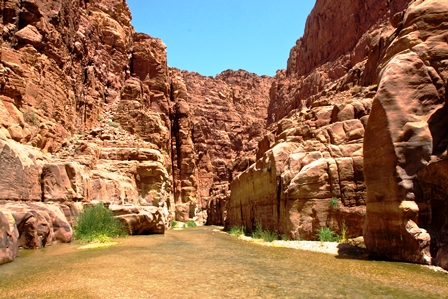
Jordan has decided to study the implications of joining the United Nations Economic Commission for Europe (UNECE) Convention on the Protection and Use of Transboundary Watercourses and International Lakes (Water Convention), launching the process on 10 March 2015 with a national workshop on “Legal frameworks for transboundary water cooperation: Focus on the Water Convention”, in Amman. The workshop, attended by members of an interministerial committee created to consider the Convention, was held under the patronage of the Secretary General of the Ministry of Water and Irrigation of Jordan, Mr. Basem Telfah.
At the workshop, Mr. Telfah highlighted the need for “a stable framework for the sustainable management of the Jordanian water resources”, considering the challenges faced by Jordan, including the instability in the region. He added that, in this regard, it was “important for Jordan to understand the legal and technical aspects of the Convention”.
Jordan faces severe water scarcity problems and is highly dependent on transboundary surface water and groundwater resources, sharing the majority of its water sources with its neighbours Iraq, Israel, Lebanon, Palestine, Saudi Arabia and Syria. Moreover, challenges facing Jordan’s water resources are intensifying due to high water demand related to demographic growth and the influx of refugees, the impacts of climate variability and economic and social changes. Cooperation on the management of transboundary waters is therefore of prime importance to Jordan, which, despite the complex regional geopolitical context, has been successful in developing bilateral agreements for the management of several of its transboundary waters. Jordan has also ratified the United Nations Convention on the Law of the Non-navigational Uses of International Watercourses. However, the country is not part of a global institutional framework supporting the strengthening of cooperation for the management of its transboundary water resources.
The Ministry of Water and Irrigation organized the national workshop — together with UNECE, the International Hydrological Programme (IHP) of the United Nations Educational, Scientific and Cultural Organization (UNESCO) and the Global Water Partnership Mediterranean —recognizing that the Water Convention could offer a solid, comprehensive framework for transboundary water cooperation between Jordan and its neighbouring countries. The workshop detailed the obligations of the global Convention and the benefits of becoming a Party, combined with examples of its implementation on the ground.
The interministerial committee will explore in depth the relevance of acceding to the Convention in the specific Jordanian context, as a basis for a national decision on whether to join the Convention.
More information at www.unece.org/env/water/workshop_Jordan2015_WaterConvention
Note to editors
The Amman workshop was co-organized by the Ministry of Water and Irrigation of Jordan, UNECE, the Global Water Partnership Mediterranean (GWP-Med) and the International Hydrological Programme (IHP) of United Nations Educational, Scientific and Cultural Organization (UNESCO), with financial support from the Swiss Agency for Development and Cooperation (SDC).
Since its entry into force in 1996, the UNECE Water Convention has provided an important framework for improving the management of transboundary surface water and groundwater resources in the pan-European region. The Convention has become a globally-available multilateral legal framework for transboundary water cooperation, open to accession by all United Nations Member States.
The Guide to Implementing the Water Convention published in 2013 (www.unece.org/index.php?id=33657&L=0) provides a commentary on the Convention’s provisions, giving explanations of the legal, procedural, administrative, technical and practical aspects of the Convention’s requirements for appropriate implementation.
Contact information
Chantal Demilecamps, UNECE, Tel.: +41 (0)22 917 2468, E-mail: [email protected]

